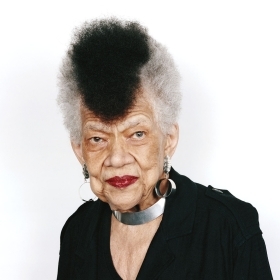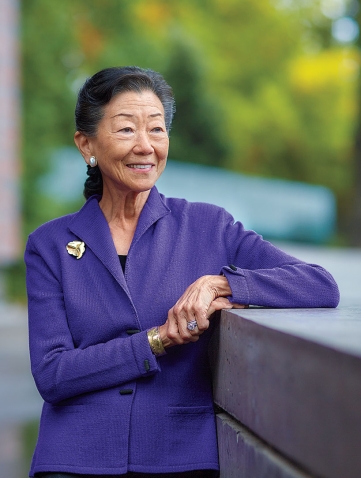A palm reader once correctly inferred that “why” is the favorite word of Lulu Chow Wang ’66. The Wall Street leader and philanthropist has always had an insatiable curiosity, she says—a quality that drives her to want to better understand and improve the world.
Wang has had an illustrious career in finance, culminating in becoming founder and CEO of Tupelo Capital Management, a pioneering investment firm in New York that she named after the bucolic point on Lake Waban.
Students and alumnae also know her name because it graces the entrance of Wellesley’s Lulu Chow Wang Campus Center. The heart of campus, it opened in 2005 and is now affectionately referred to as “Lulu.” As an alumna who maintained a deep connection to students, Wang envisioned the center as a sorely needed place on campus for the community to gather and recharge.
“There was no place to go,” she says. “I didn’t want students to always go off campus to have a social life.” She and her husband, Tony, brought her vision to life with a record-breaking $25 million gift to Wellesley in 2000—at the time, the largest gift ever given to a women’s college. The innovative center features soaring spaces, cozy firelit corners, the student-run pub Punch’s Alley, and stunning views of Alumnae Valley. It quickly became the main hub of campus, a place where students come to study, socialize, and relax.
While the campus center is Wang’s physical campus landmark, she has also spent decades in service to Wellesley, deeply thoughtful about the needs of students and the larger community. She’s a trustee emerita of the Wellesley College Board of Trustees and a long-serving member of Wellesley’s Business Leadership Council, and in recent years she has helped grow and advance the College’s career education center.
One of four girls in a family of strong-minded women, Wang says her family “never thought we should have useless or decorative lives, but lives that mattered to our family and the world.” Wang came to the U.S. in 1948 with most of her family when she was 4. Her father was a Chinese Nationalist leader, and the family could not return after the Communist revolution in 1949. She quickly learned English and grew up among school friends and a strong Chinese American community.
Going to Wellesley was a financial challenge for her family, she says, but her mother advocated for her to attend. She looks back at her time as a student with both gratitude and a little regret: “I couldn’t focus as much when I was there,” she says, “it was so much fun … I spread myself thin, grazing rather than feeding deeply. But I’m glad I spread my wings and tried everything.” She left behind some high school interests, like athletics, and seized the chance to explore her love for science and the arts—passions that are embedded in her personal and professional pursuits today.
The sense at Wellesley that students should know their purpose made a deep impression on her. “We took ourselves very seriously in that regard,” she says. “That was such great preparation for going into a highly competitive field that was primarily male. … You had to have an inner drive to get where you wanted to be.”
Wang met Tony as a teenager, and they married in their early 20s. She initially stayed home while he pursued his work on Wall Street as a securities lawyer. But they always loved to share each other’s interests, she says, and even enjoyed “friendly competition” at times. When their son started school, her curiosity led her to Wall Street. She joined that world without any experience or mentors, but she was eager to learn how things worked and why some businesses succeed and others fail. She leveraged her Wellesley writing skills into a position as a financial editor, and after realizing she loved investing even more than editing, she worked her way over to the investment side, earning an M.B.A. from Columbia Business School along the way.
“It was an intellectual challenge that was just intoxicating,” she says. “The idea of finding opportunities that other investors hadn’t quite discovered. Developing a successful thesis and then investing in it before others gave me a competitive high that was even more rewarding than a financial windfall.” She was able to succeed on Wall Street, she says, by tapping into the passion for excellence she had honed at Wellesley.
She’s spent the decades since then building the kind of base of support for women in finance that had not been available to her early on. “I couldn’t be more emphatic about the importance of women helping women,” she says. “I’ve always felt that my particular contribution has been able to provide that helping hand for other women.”
President Emerita Diana Chapman Walsh ’66, a classmate who worked closely with Wang to develop the campus center, calls her a “truly remarkable woman.”
“She has done as much or more for Wellesley than any living alumna,” Walsh says. “Lulu is quite simply a marvel—brilliant, indefatigable, full of enthusiasm and creativity, innately generous, impeccably kind. And she is always on the lookout for ways to help other women succeed.”
To succeed but also maintain balance, Wang says, women have to be mindful about how and where they spend their time. These days, she serves on many boards and is as occupied as ever—but she also finds time for the hobbies she shares with her husband. They are avid collectors of American art and also collect, restore, and rally vintage race cars. When she spoke to Wellesley, she was preparing to go to a women’s car rally in the Swiss Alps.
She advises Wellesley alumnae who are struggling to balance competing demands to “think carefully if what is being proposed to you aligns with your core interests or values,” she says. “Women who are talented are always going to have so many things brought to them. We need to really be selective.”
Wang has clearly taken her own advice—by dedicating her life to doing what she can to advance women, Wellesley, and the world.
Amita Parashar Kelly ’06 is a supervising producer at NBC News who also loves the word “why.”





We ask that those who engage in Wellesley magazine's online community act with honesty, integrity, and respect. (Remember the honor code, alums?) We reserve the right to remove comments by impersonators or comments that are not civil and relevant to the subject at hand. By posting here, you are permitting Wellesley magazine to edit and republish your comment in all media. Please remember that all posts are public.